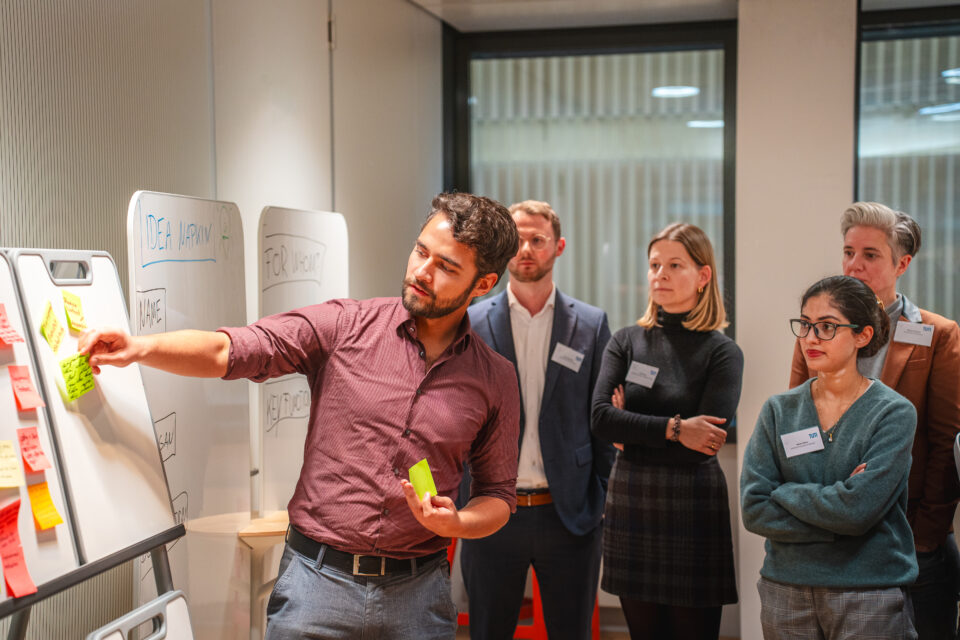TUM Think Tank
Where today's societal challenges meet tomorrow's technological excellence.
In an increasingly digitally interconnected world, the rise of hate speech poses a particular threat to tolerance, diversity, and respect. To address the escalating issue of online hate speech, representatives from science, business, the public sector, media, and civil society gathered last week at the TUM Think Tank and the Bavarian State Center for New Media (BLM) in collaboration with the Bavarian State Ministry of Justice, the Society for Civil Rights, Lumen at Harvard University, and the reporting center REspect! for a two-day workshop. The goal was to build and strengthen a network that collaboratively explores strategies against the escalation of online hate speech and harmful content on the internet.

The program covered legal aspects of the Digital Services Act (DSA) and how they will be implemented in the future, the redesign of content moderation through participatory risk management, and the potential benefits of public-private partnerships in the prosecution of hate speech. Furthermore, the workshop provided insights into the perspectives of the Public Prosecutor's Office, police, and media regulatory authorities on the issue of hate online and explored strategies, tactics, and tools that democratic societies can employ to combat online hate speech. Special emphasis was placed on discussing sectoral boundaries and active participant exchange.
Participants emphasized the importance of actively involving users in the legislative process. Lena-Maria Böswald from Das NETTZ underscored that there is still much room for improvement in legislation and that civil society organizations should also have an influence on shaping these laws. "To achieve a healthier online discourse, it is crucial to work together on the root causes of online hate by collaborating not only with civil society organizations but also with legislators and scientists. Progress can only be achieved through such combined efforts."

The main insights and takeaways from the two days:
- Promoting active collaboration among different sectors is vital for exploring effective strategies and tools within democratic societies to combat hate speech online.
- In implementing the DSA, we face various challenges like transparency, inclusion, legal complexities, workload, and disparities in engagement between organizations and regular users. Clearly defining responsibilities among platform operators, regulatory bodies, civil society, and justice is a work in progress.
- Active user involvement in legislative processes emerged as a pivotal focus. Collaborating among civil society, lawmakers, and researchers is essential for meaningful progress. By exploring economic incentives in reporting, engaging citizens and academia via online forums, and educating the public on reporting methods, we can bridge the gap between users and other stakeholders.
- There is an urgency in simplifying and popularizing reporting processes, as well as making roles clearer in the process of combating hate speech. Addressing inclusivity and accessibility issues for diverse victim groups, utilizing social media and influencers to boost reporting, and recognizing the pivotal role of bystanders in amplifying reporting initiatives are key topics to promote the reporting of online hate speech.
Dr. Thorsten Schmiege, President of the BLM, outlined the diverse and longstanding commitment of the BLM to extremism prevention and against anti-Semitic hate. The BLM addresses issues such as incitement to hatred or Holocaust denial, has launched the initiative "Justice and Media – Consistently Against Hate" in collaboration with the Ministry of Justice, is a member of the Bavarian Alliance for Tolerance, and strengthens user resilience through numerous media literacy initiatives such as the Media License Bavaria. Schmiege called for even more networking: "Let us together send a signal for freedom of expression and against hate, anti-Semitism, and incitement to hatred online! Only the power of many can counter the power of many."
TL;DR
In an increasingly digitally interconnected world, the rise of hate speech poses a particular threat to tolerance, diversity, and respect. To address the escalating issue of online hate speech, representatives from science, business, the public sector, media, and civil society gathered last week at the TUM Think Tank and the Bavarian State Center for New Media (BLM) in collaboration with the Bavarian State Ministry of Justice, the Society for Civil Rights, Lumen at Harvard University, and the reporting center REspect! for a two-day workshop. The goal was to build and strengthen a network that collaboratively explores strategies against the escalation of online hate speech and harmful content on the internet.









